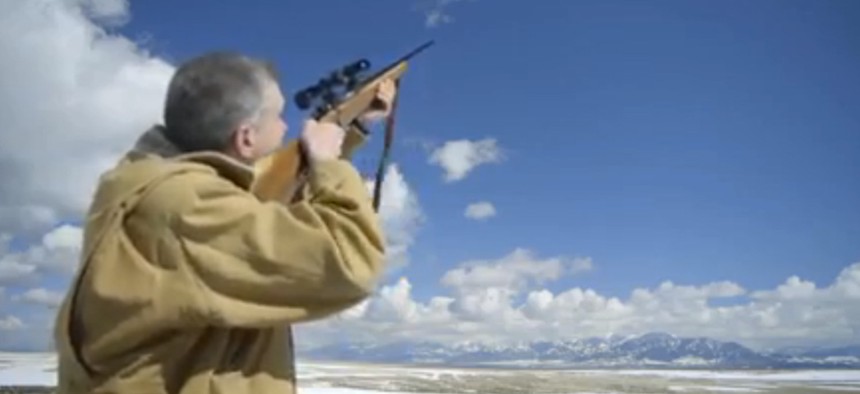Watch a Congressional Candidate Shoot Down a 'Government Drone'

House contender Matt Rosendale of Montana wants Big Brother out of his airspace.
As a "government drone" hovers over Matt Rosendale, the Republican House candidate from Montana tells the camera what he thinks of government overreach, regulation, and "spying on our citizens."
Then, standing in front of an ATV, Rosendale coolly puts a rifle to his shoulder, looks up through the sight and "downs" the drone with a single shot.
"The federal government is too big and too powerful," Rosendale says. "I'm ready to stand tall for freedom and get Washington out of our lives," he says.
Rosendale is trying to stand out in a five-way primary for Montana's at-large seat in the House.
Sporting a barn jacket and a flattop buzz cut, the state senator lowers the rifle and pledges to get the feds off his constituents' backs—or at least not hovering over their heads.
Montana is among the states that prohibit law enforcement from using drones without a warrant. On the federal level, U.S. Customs and Border Protection runs surveillance operations with its nine-drone fleet.
Customs also loaned its drones to other agencies for surveillance missions 700 times over a three-year period, including to state and local departments. The Electronic Frontier Foundation and other advocacy groups have expressed concern that these missions have strayed from the government's border-security directive.
Though it's unlikely the government has sent drones buzzing over Rosendale's property, which is in a small town not particularly close to the Canadian border, he's tapping into the sentiment that helped fuel Sen. Rand Paul's drone filibuster last year.
Paul envisioned a scenario in which the government could use a drone to take out an American "in a cafe in San Francisco" so long as the target was suspected of being a terrorist. The Obama administration responded that Americans not engaged in combat would not be the target of drone strikes on U.S. soil.
Still, some—and not just Republicans—are concerned that the government's growing use of drones could lead to privacy overreaches if not kept in check. Sen. Dianne Feinstein, D-Calif., said earlier this year a drone spied into her house and called for guidelines for law-enforcement use of the technology. The ACLU and Electronic Frontier Foundation are among groups who hope to set strict boundaries for drone use by the government.
Shooting down a drone, however, is illegal, according to the Federal Aviation Administration.
Here's how the agency responded when a small town in Colorado made it legal to hunt drones: "A [drone] hit by gunfire could crash, causing damage to persons or property on the ground, or it could collide with other objects in the air. Shooting at an unmanned aircraft could result in criminal or civil liability, just as would firing at a manned airplane."
Rosendale isn't the first candidate to send a bullet at a chosen specter of big government. Obamacare and cap-and-trade have previously found themselves in candidates' crosshairs.





